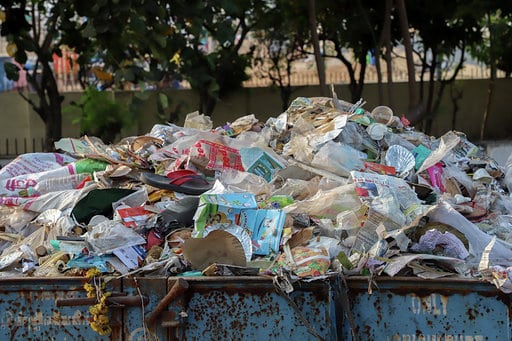Tree leaves, bamboo, lotus leaves, palm leaves, rice straw, gourds, hemp twine, coconut shells and shells of shellfish are some of the natural materials that were used for packaging in the olden days.
It was common at the turn of the century, for all items purchased, whether cooked or prepared, to be wrapped using indigenous materials, so as to preserve their freshness, prevent pollution, protect them from damage and store leftovers.
Our parents and grandparents frequented small local kirana stores with steel dabbas to get flour and spices. Fast-forward to the present scenario, finding stores where you’re able to purchase food and household staples without plastic packaging is a big challenge as the information on this is scarce.
Difficulty reducing plastic as a consumer
As consumers, we face a barrage of public interest messaging asking each of us to be responsible citizens and eschew harmful products, environmentally unfriendly materials, and so on. The burden of proper waste management is placed on our heads. But if one seriously tries to follow these diktats, one finds they are not easy.
Citizen consumer and civic Action Group’s (CAG) brand audit (analysing the plastic waste we generate in terms of which brands contribute the most to the waste) in the past couple of years has consistently shown that the majority of plastic waste generated in households comes from grocery packaging.

Considering all food items and household products come packaged in plastic, what is the alternative? As a concerned and responsible citizen, how do I avoid this waste?
Read more: CAG Brand Audit: Who’s the biggest plastic polluter in the city?
Lack of information on recycling plastic
On the face of it, the only option seems to be recycling. But recycling information is poor on the packaging so a consumer cannot tell if the packaging is recyclable or not. In addition, most waste shops do not take such packaging; especially the multi-layered kind that is common for snacks, masalas etc.
Most importantly, recycling requires fresh plastic (virgin plastic) to be added and thus is not reducing the plastic waste. The only true solution is to reduce plastic waste generation.
The question that comes to mind, of course, is how do I, as an individual, reduce the plastic waste I generate when everything comes in plastic? One good news is that there are a series of independent shops that sell fruits, vegetables, groceries and other household items without plastic packaging by promoting the concept of bringing your own containers and filling them up. But how to find them?
With this in mind, CAG sought to develop a database of shops that sell daily household products and groceries without plastic packaging. This is when the insidious nature of plastic becomes clear – fully plastic-free shops are far and few between.
These are usually the eco-conscious shops whose USP is ‘no plastic’. But then the logistics of such a system are quite complex and expensive thus requiring them to charge considerably more.
Small, local stores the answer
As we explored this space, we realised we were overlooking the obvious. Countries like India, where informal systems are still strong, where there are multiple networks that cater to different audiences, where traditions continue to hold sway, do have options.
In short, there are many small local shops that sell plastic packaged, branded items but also offer some products without packaging. Wherever you live in India, if you think about your neighbourhood you will realise that there are such shops that sell out of gunny sacks. The shopkeeper will measure out as per the customer’s requirement. It is true of course that nowadays they will pack your order in a plastic bag as it’s cheap and convenient. However, they won’t bat an eyelid if you take your own container! You can try it even at the local meat shop or wet idli batter shop.
Read more: Must return to our past and ‘Manjapai’ for a better, plastic-free future: Supriya Sahu, IAS
Database for Chennai and other cities
The database, therefore, seeks to reinforce this old practice of taking utensils to the shop and refilling it. The database began with an effort to crowdsource the information via Google Form. While there was much interest in the app, the crowdsourcing did not go to plan. We received just 17 responses. Undaunted, we reached out to our contacts in different cities in Tamil Nadu and requested them to mobilise volunteers to gather this data.
This netted us a list of 844 shops across five cities – Chennai, Coimbatore, Thiruvarur, Thiruvannamalai, and Madurai. Of course, most, if not all, of these shops sell items packed in plastic, but our focus is on the fact that at least a few items are sold without that packaging. We hope this database will be of use to our socially and environmentally conscious citizens and to those who want to make a change in their lifestyle but find that initial step a little hard!
Do check out the database. For shops located in Chennai, click here. If you know of any other shops, do share the details via this form and spread the word about this database so it might be of use to more people!
Nice article on plastic package free shops. Great initiative to develop this app. Will be more useful for SWM practitioners like me. Can we add more shops to this list? How do we do this.?
Thank you! Yes please do add shops you know of. On the database webpage (https://www.cag.org.in/zero-waste-stores) there is a tab on the top right saying “Add a store”.
we should stop ordering from a shop delivering with plastic bags. Reliance Jio should stop using plastic bags for delivery of groceries
Do check out Eko-Lyfe A Zero waste Store by Soul Garden Bistro in Ananda Road Alwarpet.You can contact 9080062885 for more details